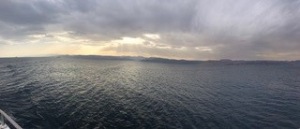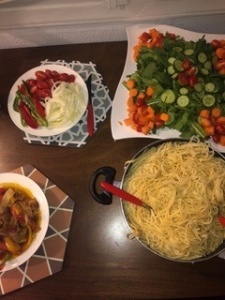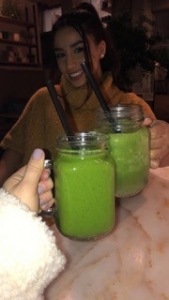Written by Maria Farnan, (American University) Student Correspondent CET Jordan: Intensive Language Spring 2019

“ما بدي كيس، لو سمحت”
Before you grab for your Al-Kitaab textbooks to decipher the above phrase, I should make you aware that its translation will not be found buried within the chapters that prepare you to engage in conversations of culture, conflict or foreign policy.
Nature has always given me this overwhelming sense of comfort, having been born and raised in a little beach town on the coast of New Jersey. Prior to my studies at University, I valued the environment for it superficial benefits: waves to surf, mountains to ski, and sunrises to admire in solitude. It was not until I was granted the opportunity in college to intersect my passion for the environment with my studies of International Relations and Arabic that I came to realize that I simultaneously wanted and needed to express the role that environmental change has in exacerbating conflict in the Middle East and North Africa — an area that is undeniably vulnerable to environmental pressures and resource scarcity.

My passion for Sustainability and Global Health is what initially inspired me to study abroad in Jordan and continues to motivate my studies here, despite feeling lost at times along the way. Any student studying abroad will experience culture shock in one way or another and I think that mine came in a very tangible wave — like the first week when I went to the khadarjee (fruit & vegetable market) and reluctantly placed each individual food item in its own plastic bag: 4 cucumbers, 1 red onion, 1 head of romaine and a few other random items that barely came together to make a salad for four using a grand total of 8 plastic bags.
After 3 weeks of living with an overly stimulated guilty conscious and a growing stockpile of plastic bags under my kitchen sink — I decided that I needed to make a change. I swallowed my fear of standing out in the market, awkwardly shoving my reusable bags with everything from tomatoes to pomegranates and more importantly, on the days where I would impulsively stop in without my reusables, I learned how to politely refuse a plastic bag – “ما بدي كيس، لو سمحت” obliging to uncomfortably juggle the items on the short return to my apartment.

Currently now at three months and many visits to the market later, this simple sentence continues to be one of the most liberating insights that has characterized my time abroad. Each day, I am standing up for what I believe in despite a language and cultural barrier — and I have even been applauded for my efforts in subtle but impactful ways. On one occasion, the small store owner responded remarking, “I wish more of the people within my country would do the same – these bags are everywhere in the street it is so sad”. I politely laughed and thanked him again and immediately went home and read countless articles of plastic consumption in the region and possible avenues of advocacy that I could pursue. I often visit him to pick up groceries and each time I check out, he slowly reaches for a bag, knowing that I will deny and we both laugh over his tests of my persistence.
The environment is what connects all people of the world. It does not discriminate on the basis of ethnicity, gender, religion, nationality or sexual orientation. It is a topic that demands bipartisan and international cooperation and collaboration, encouraging implementation of policy that serves to protect and preserve it for the safety of future generations. In each moment where I feel that I am being inconvenienced for being environmentally conscious (for example, I will never know what shawarma or traditional mansaf tastes like as a strict vegetarian) I am grounded, realizing that there are too many people in the world climate suffering due to lifestyle choices, educational disparities and innate geographic differences. I hope to use my study abroad experience in Jordan to garner a deeper understanding of environmental issues and discourses as they exist in this region in order to promote sustainable policies, in Arabic and English, that will allow the world to remain a vibrant place for all to enjoy — starting with one reusable bag at a time.